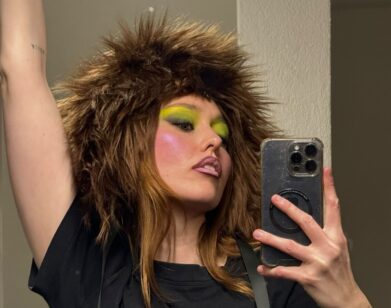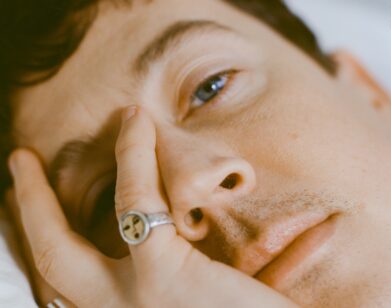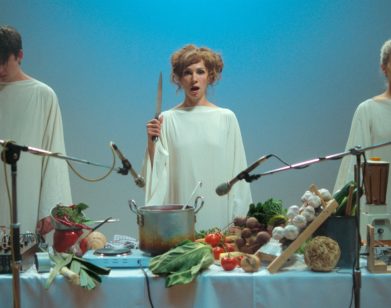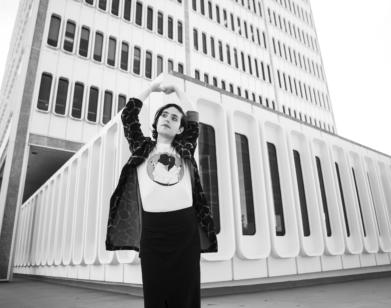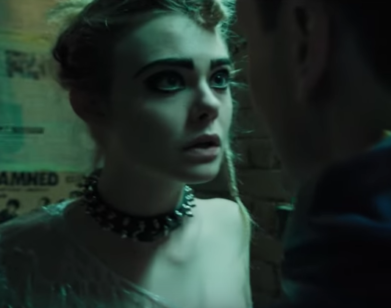In Conversation
On Sex Education Aimee Lou Wood Is More Than Just a Best Friend

Jacket by Celine. Earrings by Annoushka.
Playing the best friend can be a thankless role, but in a show as wise as the Netflix comedy Sex Education, and in the hands of an actor as appealing as Aimee Lou Wood, it can become transcendent. As Aimee Gibbs, the ride-or-die to one of the series’ lead characters Maeve Wiley (Emma Mackey), the 26-year-old Manchester native has deftly navigated an arc that took her from a people-pleasing member of the popular clique at Moordale Secondary School, to a multi-dimensional young woman who, even as she reckons with the trauma of a sexual assault, manages to be a constant source of comic relief (the role earned Wood a BAFTA Television Award for Best Female Comedy Performance). With the Sex Education officially renewed for a fourth season, Wood got on the phone with her friend, the British actor Alex Sharp, to discuss unlocking her character and where she might go from here.
———
AIMEE LOU WOOD: It looks like you’ve gone to the coffee shop. Where is the closest coffee shop?
ALEX SHARP: Oh, god. At least half an hour.
WOOD: Really? In the car?
SHARP: No, horse and cart. I don’t believe in vehicles; I just ride my pony into town. Or my goats.
WOOD: Speaking of goats, you’ve also worked with a goat.
SHARP: Well, we were in close proximity. I didn’t have much of an intimate relationship, that was more my costar than me. But I have been on set with a goat. How was yours?
WOOD: She wasn’t a natural, I have to say. She didn’t quite realize that she couldn’t poo constantly, that it was a bit uncouth. Did yours poo everywhere?
SHARP: Oh, boy.
WOOD: It’s fascinating because they just shake their body and loads of pebbles come out, seemingly out of nowhere. So a lot of the scenes where there’s poo around the goat, it looks like it was in the script, “And the goat poos.” But a lot of the time, there was simply just poo there.
SHARP: It’s not right that on set, someone’s job is to clean up the shit of a farm animal. That doesn’t seem fair.
WOOD: I know, I think it fell under art department.
SHARP: It always falls under art department.
WOOD: The art department on Sex Education are incredible. You’ll look in your school bag and you don’t think there’s going to be anything in it, apart from papers to make it look full. But in the notebook, there will be notes that Aimee’s made, mind maps, because Aimee loves mind maps, and Aimee and Maeve playing knots and crosses. It’s so sweet.
SHARP: I feel like the show has a lot of heart and you feel very connected to all of the characters, even though they might be going through something that’s quite otherworldly to the audience member. It’s just well-structured, and there’s always something deeply relatable. The second you start to dislike a character, suddenly they’re incredibly sympathetic. I just feel joyfully manipulated by the whole thing. It’s beautifully done, and it keeps getting better and better, and you’re fucking brilliant in it.
WOOD: Thanks, Alex.
SHARP: You’re such a brilliant actress. I love hanging out with you, and then when I’m in America, I just get to watch this great TV show that you’re in and hang out with you that way.
WOOD: I really want you to be in a TV show so I can do the same.
SHARP: You’re an unusually generous person. To be truly generous is quite a rare trait, and you have that in oodles.
WOOD: I think it’s important to be a generous actor. I had the best time acting with you because you’re so generous and giving and present. It can be a very lonely experience if you’re doing a scene with someone, and they’re fixed on an idea of what they want to do and you may as well be a cardboard cutout. And you’re there thinking, “Hello?” It’s like when you’re in a conversation with someone in real life and you know they’re just completely in their own universe and not particularly interested in connecting.
SHARP: It’s like Chekhov, ships in the night. When you read Aimee on the page, does her humor and the humor that you portray in the show feel natural to you? Does it feel close to your own humor? Or was there a journey of discovery to find how she was comedic?
WOOD: I don’t know if you know, but I originally auditioned for Lily. I went in three times for Lily and I read with Eric to do that scene, in season one, where she’s asking him to have sex with her.
SHARP: Oooooh.
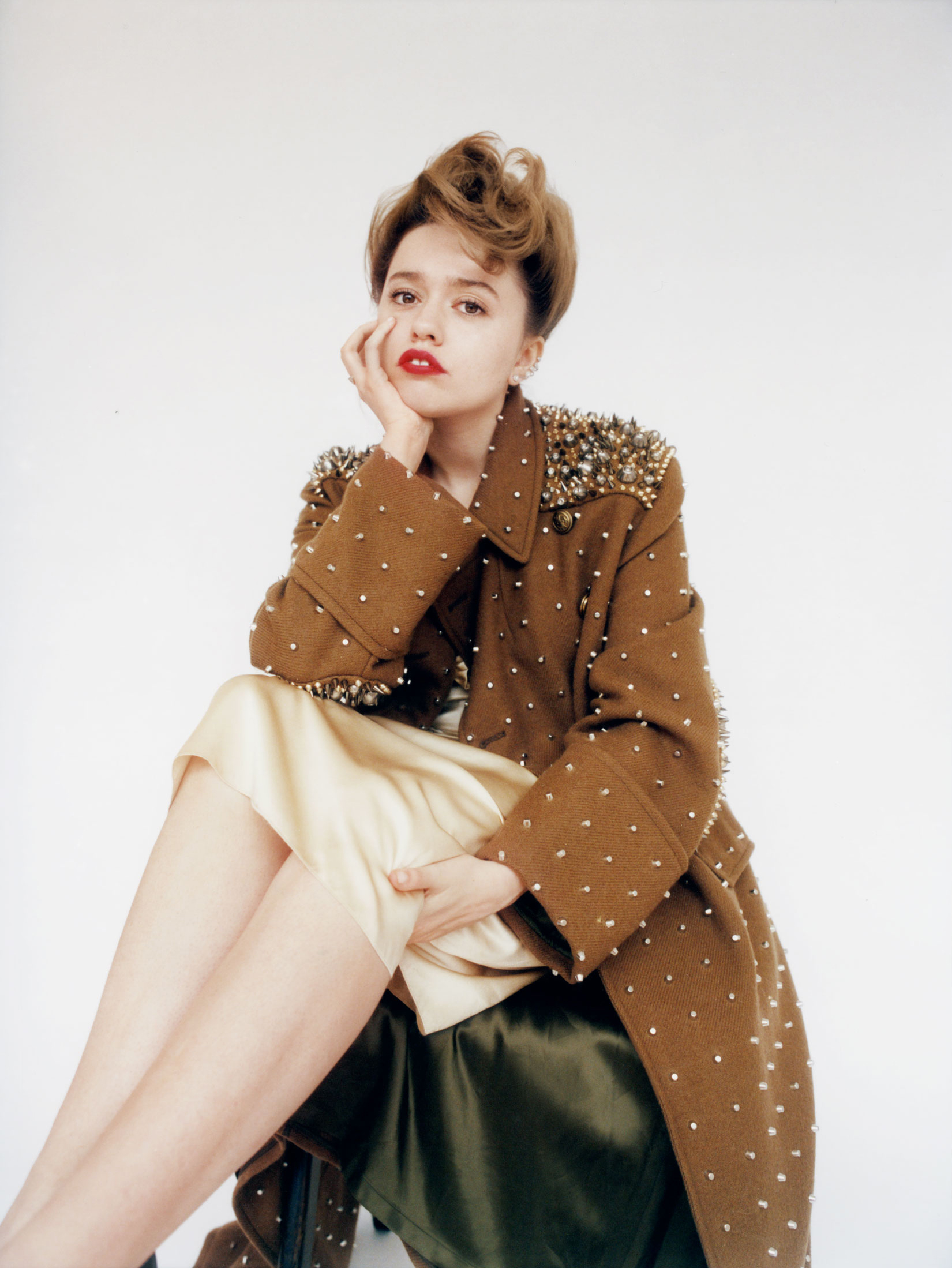
Dress and Coat by Miu Miu. Earrings by Messika.
WOOD: Yeah. I loved Lily as a character. I didn’t see the rest of the script for the show, I only saw Lily’s bit. Then I went in three times for her, but something wasn’t quite right. Then after the third audition, it was that horrible thing where they’re like, “It’s not going to go your way for Lily.” I was so upset, and I’d actually seen Tanya [Reynolds] in the audition after I’d gone and auditioned, and I remember saying, “That’s Lily, she’s getting the part.” I was like, “Fuck.” And then they said, “But can you come in tomorrow to do this other character Aimee?” who I didn’t know anything about.
Aimee was quite underwritten at that point. She was a new character and added quite late on, because they wanted to give Maeve a best friend. They didn’t really know exactly who she was, and I decided that she says these ridiculous things, but she says them with utter conviction like she believes them. She believes what she’s saying all the time.
Once I’d made that decision, Aimee became so clear to me. Like in season three, I was like, “I need to shit and it’s probably going to be sloppy because I’m anxious.” First of all, someone said this in an interview recently, they were like, “Women talking about poo is so not a thing.” Even that small detail is so original about her. She has spoken about her poo in every season, I think. She doesn’t really know that she’s a feminist but actually she is accidentally, because she is just wholly herself and she breaks molds and taboos without really knowing it, which I think is great.
SHARP: Of all the characters, she feels the most herself.
WOOD: That’s very interesting. At the start of season one, she was so muted because she was around a group of people that were using her. It was only really with Maeve that she was herself. That friendship is a huge key as well to unlocking her, because as soon as she was with Maeve all the time, then she could be her full self.
SHARP: We were talking a little bit earlier about how in season three, the writing for your character is healthily complicated and just multifaceted in a way that’s extremely satisfying.
WOOD: We were talking about this the other day, about how the season two arc is just so beautifully written and it is very, very clear. She goes through all the stages: She goes through complete denial about what’s happened to her, and then she wants to isolate herself, and she makes all these edits to how she looks, because she believes that it was her fault, and then she finally has the breakthrough where she’s in detention with the other girls and has the catharsis of getting on the bus with them all.
There was something about the season three arc that interested me even more, because it felt like such a tug of war. As you do in life, she might make one step forward, but then she takes two back. It’s very complicated in a satisfying way. She says, “I just want to be the old me again.” I think that’s what the whole of season three is for Aimee: holding onto the old her that unfortunately doesn’t really exist anymore, and also this incredible new version of her that she’s afraid to step into, because it’s new and it’s scary and growth is very uncomfortable.
SHARP: And season four will presumably continue the journey.
WOOD: Yeah. I asked Laurie [Nunn, the creator of Sex Education] the other day for some secrets, and she gave me some. What she was saying was very exciting.
SHARP: Do you have trouble not just going up to strangers in the street and just being like, “In season four, Aimee …”
WOOD: Yeah, I want to tell everyone about season four. It’s so hard because my friends are genuinely fans. It’s nice to be in something where people actually enjoy watching it. Because I’ve done Uncle Vanya, but it was quite divisive. Some of my family and friends who came to watch it loved it, but some people are a bit like, “Bloody hell.” Chekov, it’s a bit of a slog. But what’s so gorgeous about Sex Ed is that it’s universal. It’s for all ages, for all people, and everyone has someone they relate to in the show.
SHARP: When you do theater, which camp do you fall into in terms of wanting to know when people are in the audience, or not wanting to know?
WOOD: If I don’t think a performance is going well, I’ll be like, “It’s because you told me that so and so was in.” Then if it’s going badly and I didn’t know, I’ll be like, “If you’d had just told me Alex was in, then I would have been good.” It depends on who it is.
SHARP: I’ve just done the one play, but at the beginning of the run, I banished all who I loved from attending.
WOOD: Really?
SHARP: Like, “Please, please Lord, do not come to this play yet,” because I was so paralyzed with fear of humiliation. People have never really believed me when I say this, but the first preview that we did, there were like five people in a house of 1000 seats, and then the next day it was full. The jump from five people to full was so traumatic for me.
WOOD: A lot of people I know come from theater families and there will be an understanding of, “You do not come.” But my family don’t have a clue about that stuff, so they’re like, “We’re here on the first night, we’re here on opening night.” And it’s the first preview.
SHARP: I think one’s perception of your own performance is always quite off.
WOOD: Yeah. Also, when you think you’ve had a good night and then the next night, you’re like, “That was horrendous.” Actually, the difference would probably be either microscopic or unnoticeable. But to us it feels like light-years apart. So yeah, you are right, feeling good is not always good for the audience. Sometimes you’re feeling the character. That’s what’s so hard. Because I would feel so sad and horrid, and then I’m like, “Oh, but the character felt sad and horrid, so actually it’s just the residue of that.” But then you think it’s your performance that you’re feeling sad about.
SHARP: I struggle with that a lot. But I’ve also found the repetition of doing a play very freeing. You eventually get past all of these things that we’re talking about because you become desensitized to it, which can be really dangerous, but can also set you free.
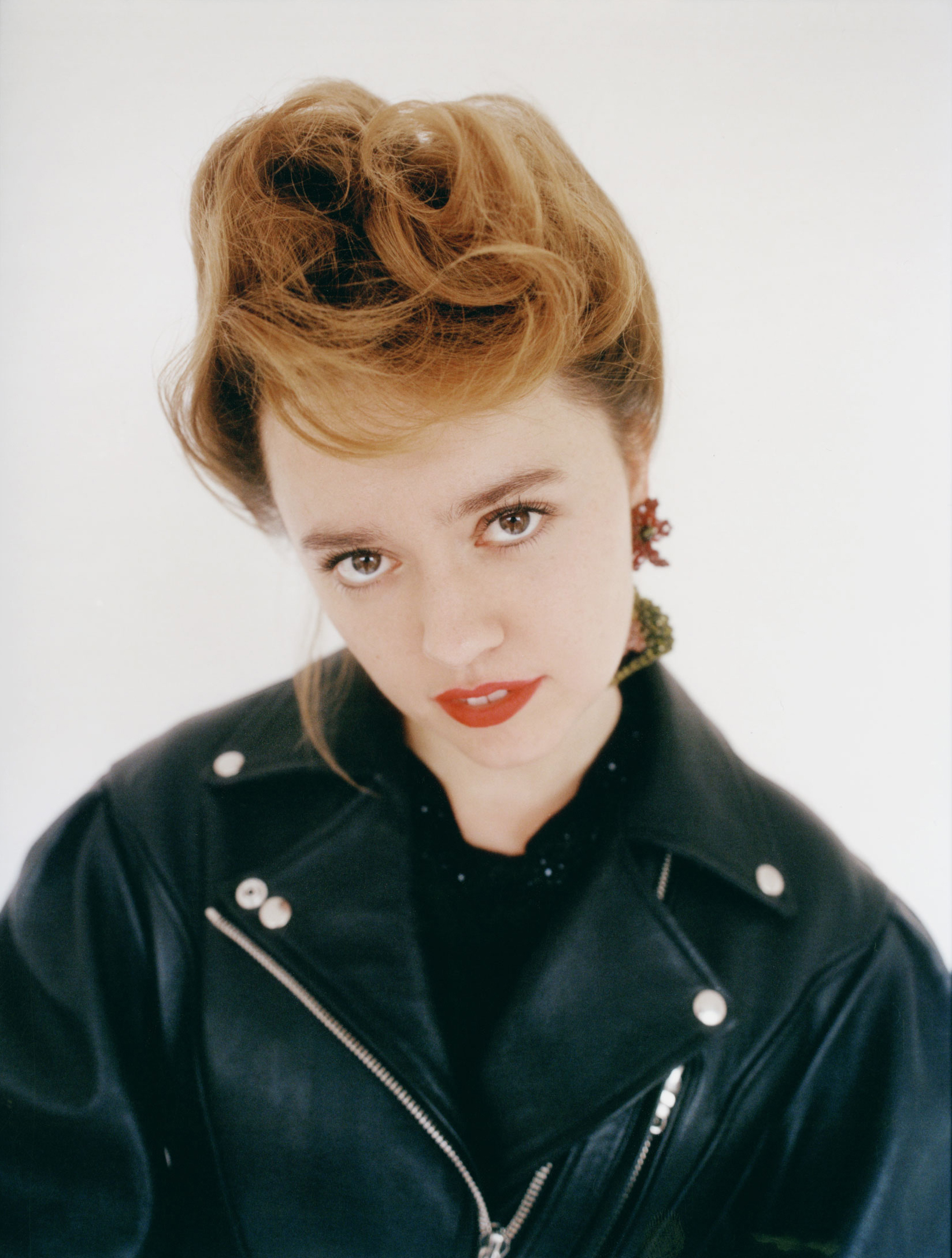
Cardigan, Coat, and Earrings by Simone Rocha.
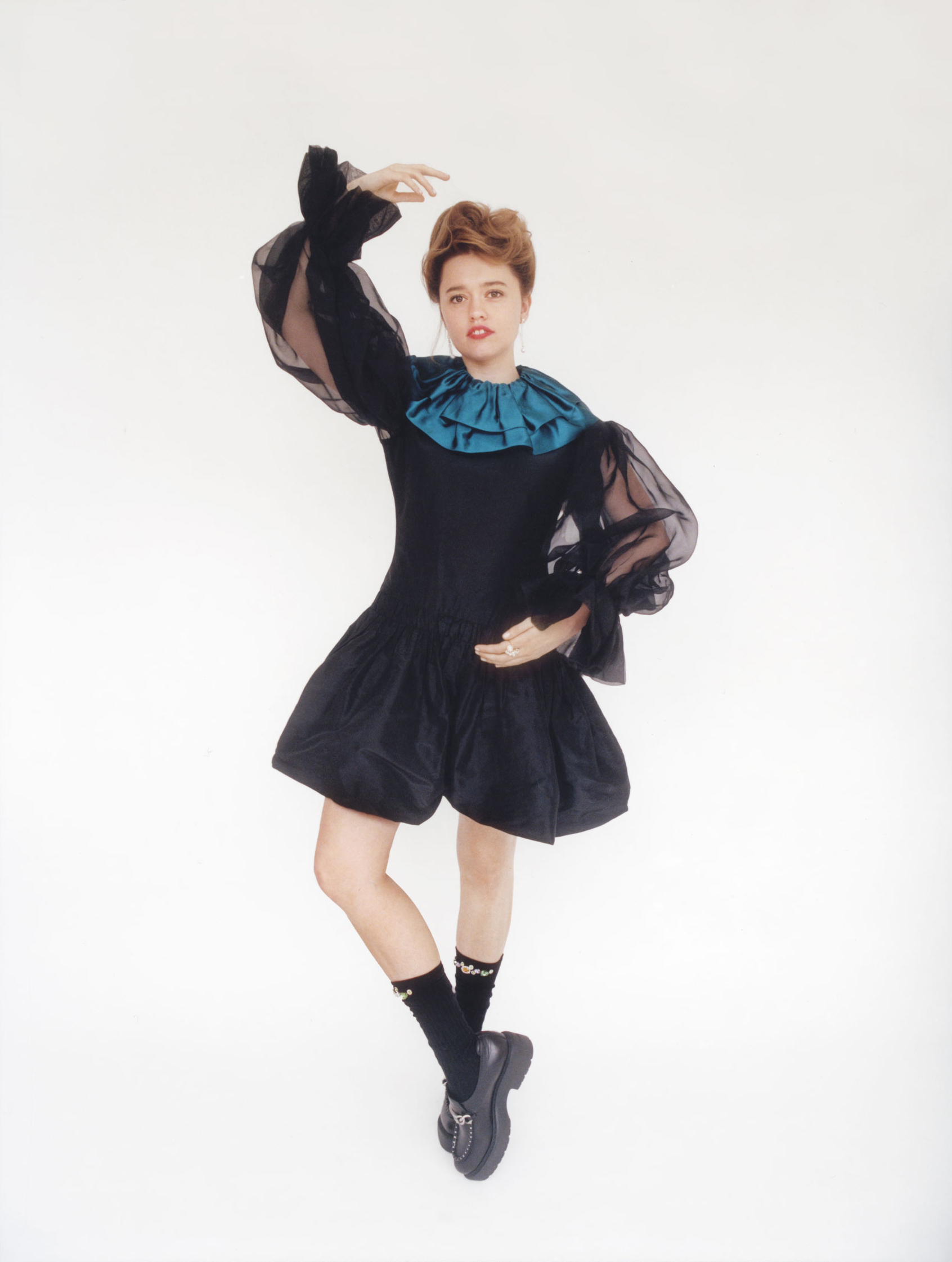
Preen by Thornton Bregazzi. Dress by Shushu. Socks by Tong. Shoes by Miu Miu. Earrings by Sophie Bille Brahe. Ring by Completed Works.
Makeup: Emily Wood using Byredo.
Hair: Patrick Wilson
Production: Alexandra Oley
Season 3 of Sex Education is now available on Netflix.

